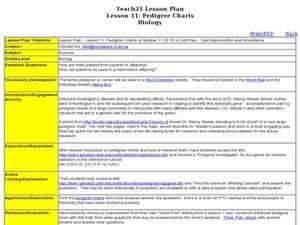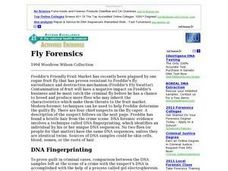Curated OER
DNA Basics, Bacterial Cell Walls
Some basic descriptions of DNA and the appearance of structures in a bacteria are included along with great diagrams. The presentation has clear, but detailed slides, and your students will find the information about Gram staining easy...
Cold Spring Harbor Laboratory
Genes Are Real Things
Proving microscopic structures exist is a difficult task. Learn how scientists did just that in the mid-1800s as they set out to identify the cellular structures related to genetics. The online lesson explains the collection of work that...
Radford University
Are You Faster than Bacteria?
Just how fast does bacteria grow? Over the course of three lessons, pupils investigate exponential growth with the use of bacteria growth. During the lesson, bacteria from a cell phone is grown to make a connection to real life. Using...
Curated OER
Study of the Cell
Students draw a diagram to show the fluid mosaic model of a membrane. They explain how hydrophobic and hydrophilic properties help membranes hold their shape. They identify the functions of different cell membrane proteins as well.
Curated OER
What Happens When A Cell Divides?
Students investigate the cycle of mitosis. In this biology lesson plan, students discuss the different stages of mitosis through cell reproduction. They further their investigation through laboratory analysis.
Curated OER
How Cells Reproduce
Young scholars construct a mitosis flip book. In this biology lesson, students describe the different stages of mitosis. They discuss the importance of cell reproduction.
Teach Engineering
Don't Be a Square
If Parseltongue is a genetic trait, what is the probability a wizard will inherit the ability to speak Parseltongue? Scholars investigate magical and biological genetics with Punnett squares.
Curated OER
DNA, the Awesome Thread of Life
Students examine how traits are passed to offspring. In this genetic reproduction lesson students develop a model of dna and learn about its structure, replication and function.
Serendip
DNA Structure, Function and Replication
Before a cell replicates, its DNA must replicate. Take advantage of a hands-on guided lesson to teach budding scientists how this happens. Using a set of nucleotide cards, learners become the DNA and work to create matching strands...
Curated OER
What Makes a Plant a Plant?
For a plant unit in your biology curriculum, here is a slide show that bestows the basics of plant structure, reproduction, and classification. The information is general. The main point of the lesson is to highlight what characterizes...
Curated OER
Use of Microscopes and Creation of Slides
Students explore the use of microscopes and the creation of slides. They practice using, adjusting and viewing with a microscope. they view slides of familiar substances such as blood and fibers. In addition, they create slides using...
Pearson
Transcription
Teach young biologists the language of life with this series of worksheets on DNA. By working through these pages, students expand their understanding of genetics as they learn about the process of transcription and the resulting mRNA...
Curated OER
Making Connections: Exploring Our Brains through the Five Senses
Students identify structures of the brain, and neurons and analyze their functions. In this nervous system lesson plan students create drawings and models of anatomy.
Curated OER
Color Change in Leaves
Students identify the different leaf pigments and colors. In this biology lesson, students perform chromatography to separate them. They explain how light affects green leaf colors and causes falling leaves in autumn.
Curated OER
Proteins
Students conduct a variety of experiments to explore protein. In this biology lesson, students solve a mystery by testing for the presence of glucose, protein starch and triglycerides. They explain how DNA transcription and translation...
Curated OER
Pedigree Charts
Students explain how offspring inherit traits from their parents. In this biology lesson, students investigate the genes for nicotine addiction using an interactive website. They construct a fictional pedigree using their chosen...
Curated OER
Cell physiology and chemistry
Students design an experiment to discriminate between chemical diffusion, osmosis, facilitated diffusion and active transport through a membrane. Be specific about predictions and interpretations!
Curated OER
Dinosaur and DNA Days
Biology stars extract DNA samples from beef thymus and then examine its properties. They use enzymes to digest the DNA samples, and then use electrophoresis to separate fragments. Finally, they discuss methods and principles of...
Cmassengale
Bacteria: Structure and Function
For as small as they are, there sure is a lot of information for young scientists to learn about bacteria. Help simplify the subject with this instructional presentation that explores the structure, nutrition, and reproduction of...
Curated OER
DNA Extraction
Students are able to extract and observe a visible amount of DNA from Escherichia coli cells. They discuss the properties of DNA. Students confirm the presence of DNA by a reaction with an indicator.
Virginia Department of Education
The Ratio of Surface Area to Volume
Demonstrate the ratio of surface area to volume in your high school class by using phenolphthalein, gelatin, and an onion. Intrigue the class by leading a discussion on osmosis and diffusion, then making "scientific jello." Participants...
Curated OER
Classification/Taxonomy/Statistics Review
"Does King Phillip Cry Over Flimsy Grass Stems?" You might not answer that question with this exhaustive worksheet, but your biology class will get the full scoop on the hierarchy of biological classification with this resource. It...
Curated OER
Genetically Modified Organisms
High Schoolers complete a variety of activities as they examine the ethics of (and take a position concerning) genetically modified organisms in the field of agriculture. They complete a PowerPoint demonstration to go along with the unit.
Curated OER
Fly Forensics
Freddy's Friendly Fruit Market is under attack by fruit flies, and it is up to your aspiring biologists to solve the crime! By reading and analyzing the phenotypes, detectives determine which fly is responsible. This memorable assignment...

























